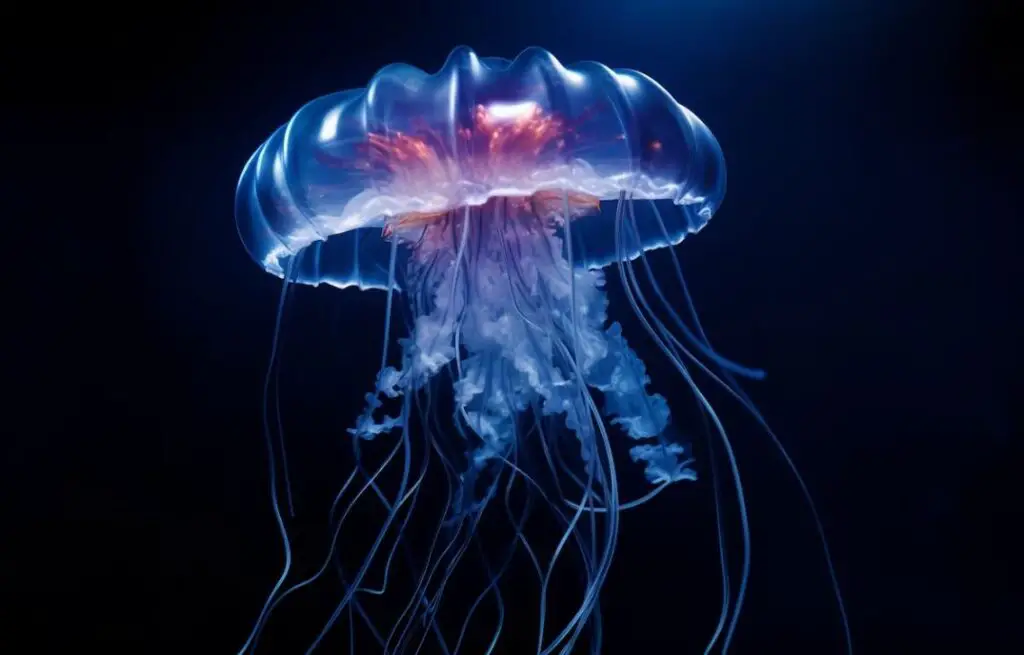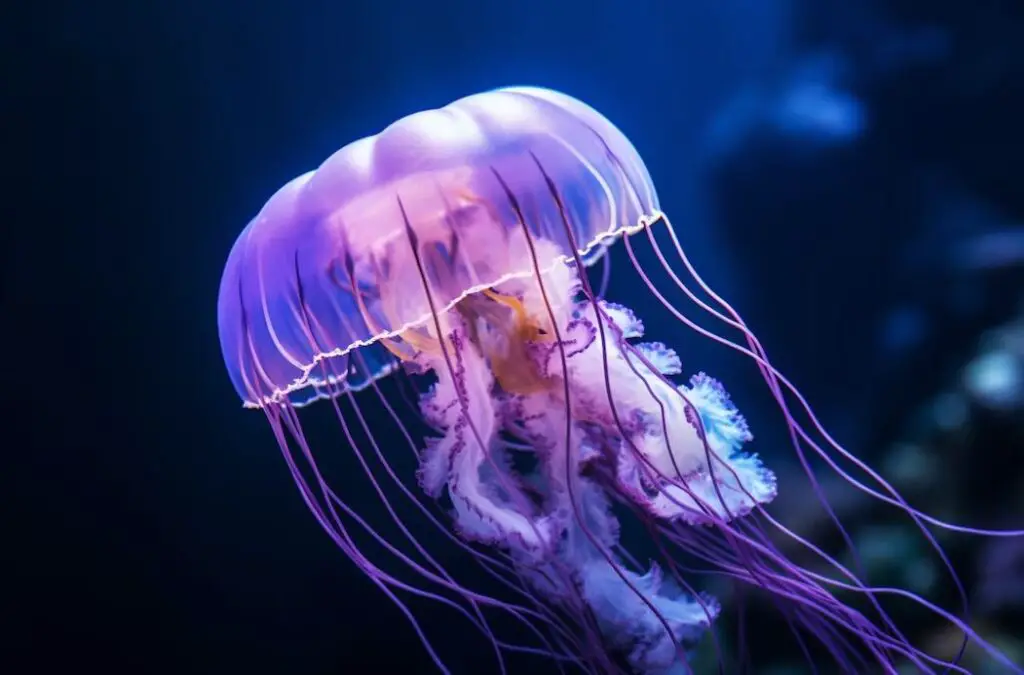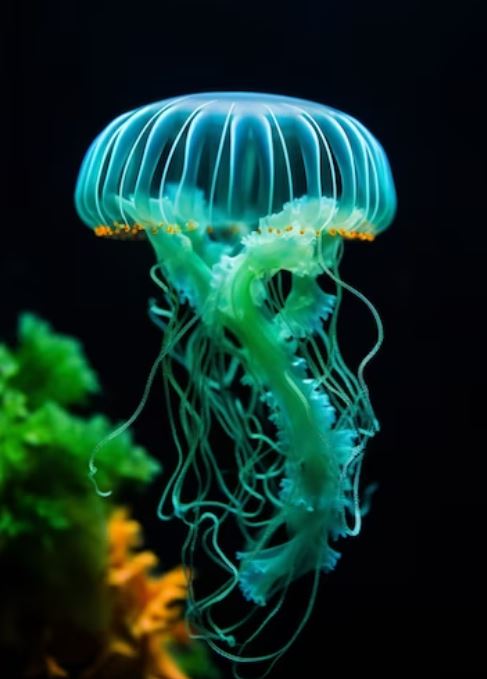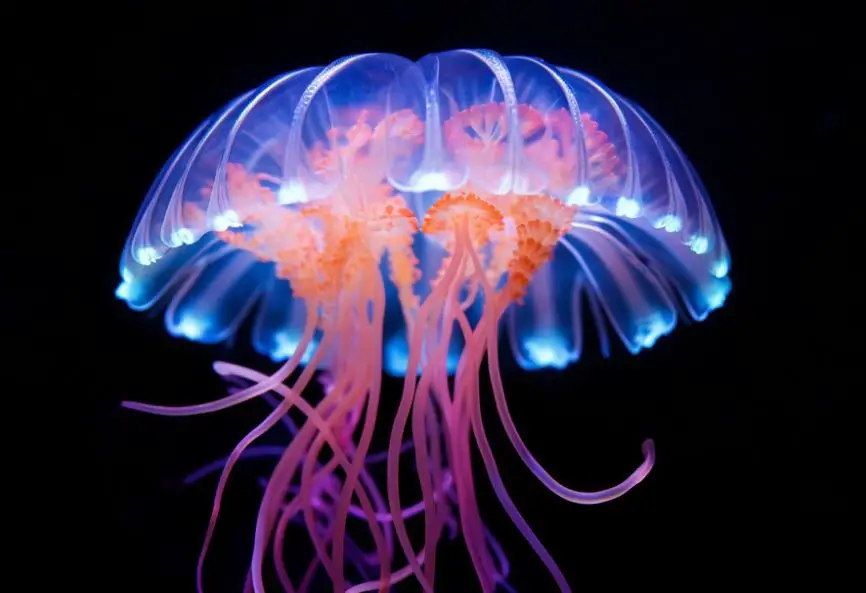Are Jellyfish Smart? How Intelligent Are Jellyfish?

Jellyfish intelligence has long been a subject of intrigue, captivating both scientists and the curious. They possess a unique allure with their graceful movements and translucent bodies. While we often associate intelligence with complex brains and cognitive abilities, the enigma of jellyfish intelligence persists.
In this comprehensive article, we delve into the mesmerizing realm of jellyfish, exploring their behaviors, neural architecture, and their multifaceted roles in marine ecosystems and human interactions.

Understanding Jellyfish Intelligence: A Slippery Endeavor
Jellyfish intelligence might not align with human notions of the term, but it is undoubtedly fascinating.
These creatures challenge our perceptions of what it means to be intelligent. How can organisms without brains exhibit behaviors that suggest some level of cognitive processing? Let’s explore.
Jellyfish Neural Complexity: An Unconventional Network
The notion of intelligence is often linked to complex neural networks, but jellyfish possess an alternative neural architecture.
Instead of brains, they rely on a decentralized network of nerve cells distributed throughout their bodies. These “nerve nets” enable responses to external stimuli, triggering inquiries into the nature of jellyfish cognition.
Navigational Abilities: A Mysterious GPS
How do jellyfish help humans and other organisms? Their navigational skills play a crucial role. Within their mesmerizing forms, jellyfish harbor specialized structures called rhopalia, which house sensory organs capable of detecting light, temperature, and even Earth’s magnetic field.
These rhopalia function as a primitive GPS system, guiding their migration across vast oceans and contributing to the intricate tapestry of marine ecosystems.

Jellyfish Intelligence: Evolutionary Strategies
When do jellyfish appear in the evolutionary timeline? As ancient marine inhabitants, jellyfish have perfected their survival strategies over millions of years.
Their apparent simplicity has bestowed upon them a remarkable advantage, allowing them to thrive in diverse oceanic environments.
Jellyfish Adaptability: A Tale of Evolution
Jellyfish intelligence is inextricably linked to their ability to adapt. Despite their lack of intricate nervous systems, jellyfish display adeptness in responding to environmental cues, seeking nourishment, and ensuring their species’ continuation.
This capacity for adaptation underscores their role as a vital piece in the complex puzzle of marine life.
Jellyfish’s Role in the Ecosystem: An Ecological Balancing Act
Jellyfish occupy a distinctive niche within the marine food chain, showcasing their ecological importance. By managing populations of smaller organisms, they contribute to the maintenance of balanced ecosystems.
Furthermore, they serve as a food source for certain species, thus perpetuating the delicate dance of life within our oceans.

Curiosities and Culinary Delights: Jellyfish in Human Interactions
Beyond their ecological significance, jellyfish interactions with humans offer a plethora of intriguing narratives.
Edible Explorations: Can You Eat Jellyfish?
While the notion of consuming jellyfish might raise eyebrows, it is a culinary tradition in several cultures. Can you eat barrel jellyfish? Indeed, you can. In regions such as Asia, jellyfish are crafted into delicacies like jellyfish salad.
The nutritional profile of a jellyfish salad is both surprising and appealing, as it boasts low-calorie content and a uniquely pleasing texture.
Jellyfish and Sea Turtles: A High-Stakes Relationship
Sea turtles eat jellyfish as part of their dietary habits. However, there’s a twist to this interaction. Specific jellyfish species contain compounds that can induce a euphoric state in sea turtles, leading to a natural high.
This fascinating phenomenon adds another layer to the intricate web of relationships within marine ecosystems.
Texture and Taste: The Pleasures of Consuming Jellyfish
The benefits of consuming jellyfish extend beyond ecological dynamics. In some Asian cuisines, partaking in jellyfish dishes is considered an exquisite culinary experience.
Beyond nutritional value, the unique texture of jellyfish enhances the gastronomic journey.
The Anecdotal Experience: What Do Jellyfish Feel Like?
What do jellyfish feel like when touched? Encounters with these enigmatic creatures evoke a range of sensations. Some describe a mild tingling, while others recount a more pronounced experience. This diversity in encounters adds to the allure of jellyfish.

Jellyfish’s Enigma: Unraveling Mysteries
Jellyfish Intelligence: Fact or Fiction?
Do jellyfish have organs that contribute to their behaviors? Research suggests that although they lack organs akin to vertebrates, their decentralized nerve nets facilitate rudimentary sensory processing.
This opens avenues for discussions about intelligence beyond conventional notions.
Beneath the Surface: Jellyfish Salad Nutrition
For those with a penchant for culinary exploration, delving into jellyfish salad nutrition is a captivating pursuit.
Low in calories and rich in collagen, jellyfish salad serves as a testament to the diversity and nutritional potential of marine resources.
Jellyfish’s Evolutionary Journey: A Glimpse into the Past
To fathom jellyfish intelligence, one must journey into their evolutionary history. As enduring denizens of marine environments, jellyfish embody a triumphant evolutionary strategy that has persevered through eons.
Their adaptation to changing landscapes reflects an inherent intelligence geared toward survival.

Jellyfish in Lore and Legends: Cultural Significance
Jellyfish in Mythology and Symbolism
Jellyfish, with their ethereal and elusive nature, have found their way into various mythologies and cultural narratives.
In some cultures, they symbolize traits such as adaptability, resilience, and transformation, further adding to their mystique.
Scientific Exploration: Insights from Modern Research
The field of jellyfish intelligence is constantly evolving. Modern research techniques, from molecular analysis to behavioral studies, are unveiling new dimensions of their cognitive abilities.
Each discovery offers a tantalizing glimpse into the intricacies of these captivating creatures.
FAQs (Frequently Asked Questions)
Why are jellyfish called jellyfish? The term “jellyfish” is derived from their gelatinous, translucent appearance.
What eats box jellyfish? Sea turtles are among the natural predators of box jellyfish.
Do jellyfish play a role in the food chain? Yes, jellyfish contribute to marine food webs, serving as both predators and prey.
Can jellyfish cause food allergies? While rare, allergic reactions to jellyfish consumption have been reported.
Are there benefits to eating jellyfish? Some cultures value jellyfish as a low-calorie, nutrient-rich delicacy.
You May Like!
In Conclusion
Jellyfish intelligence remains a captivating enigma, challenging conventional definitions of the term. Their behaviors, navigational abilities, and ecological importance underscore that intelligence takes diverse forms.
From their role in marine ecosystems to their interactions with humans, jellyfish weave a complex narrative.
As we delve deeper into the mysteries of the oceans, we find that the true essence of jellyfish intelligence lies beyond the surface, in a world where adaptations and survival strategies shape the dance of life.
